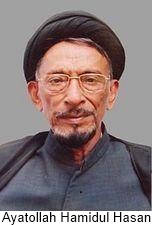
I CHANCED upon two well researched articles in Awadhnama late last year. One was by Dr Mohammad Saani and the other by Ms Razia Majeeda. As per those articles, during the last 20 years, in India alone, some 80 to 100 million infant girls were killed in their mother’s womb. Reading the articles, some other figures crossed my mind.
The World War II resulted in some 50 to 70 million casualties, the partition of India saw one million people killed on either side of the border, more than a million perished during the Vietnam war, and Saddam’s terror reign followed by the Iraq war saw a million people losing their lives. The list goes on with Bosnia, Palestine, Afghanistan, Syria, and others. So much bloodshed! Is this all in the name of Islam? Compare these figures with the female infanticide in India alone!
Now let me connect the dots.
Some 4500 years ago, a lone mother, sitting close to Kabah in Makkah, was trying to save her thirsty infant with no water in sight. Her prayers were answered by the Lord Almighty. Water gushed out as the crying child rubbed his ankles on the ground. The well didn’t stop after that. People from all over the world started taking back small quantities of water from the well as they return from the holy land. The miracle well was named Zamzam. One of the meanings for Zamzam in Arabic is ‘hearing vibrations of a far away sound’. This far away sound can now be heard by the faithfuls not just in Makkah, but also when they return to their respective countries. A life in Makkah was so saved that it gave a whole new meaning to millions who face Kabah every single day.
Some 3000 years after the Zamzam miracle, another incident happened at the same place. The place was now known as Hijr Ismail (hijr in Arabic means ’embrace’) in memory of the Prophet. A man is sitting, surrounded by an eager audience. There is another man at some distance, circumbating the Kabah, with cotton in his ear. He is a trader on a business trip to the city. Some people cautioned him against listening to the man sitting on the wall, as he seems to do magic on people. If he dares listen to him he’ll forget all teachings of his forefathers, he was told.
The trader saw the crowd gathered around the man and got curious. ‘What on earth is he talking about,’ crossed his mind. He couldn’t resist taking the the cotton out. A magical voice reached his ears, and travelled all the way to his heart. The words he heard indeed casted a spell on him. And why not, they were from the Almighty, the one who established the signs of a child (Ismail) and his mother’s (Hajar) for all generations to come. The Almighty wanted the world to remember the place as a centre of peace and protection. The trader heard the man saying
Be good to your parents;
Kill not your children on a plea of want;
We provide sustenance for you and for them;…
Take not life, which God hath made sacred, except by way of justice and law…
(Surah Al-An’am (6), verse 151)
And come not nigh to the orphan’s property, except to improve it, Until he attains the age of full strength;…
Whenever ye speak, speak justly, even if a near relative is concerned;…
(Surah 6, verse 152)
Thus doth He command you that ye may be righteous. (Surah 6, verse 153)
The trader, Asad Bin Zarara, was speechless. He did a real business that day – trading the good for his wrongdoings of past!
There’s only one message coming out from both Hijr-e-Ismael and the wall of Kabah – identifying the killer and what constitutes killing, and to shun both, is the real Islam.
Now it’s for us Muslims to understand and propagate this message of peace that has come to us through the holy Prophet [PBUH] and his household. We need to stand up for the downtrodden and reject those bent on shedding blood!
(Translated into English by Inam Abidi Amrohvi from the Urdu series “Qatl, Qatil aur Islam” by Ayatollah Syed Hamidul Hasan. The author is a leading Muslim cleric of India. He is also the principal of Jamia Nazmia.)